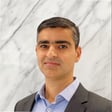Become a Creator today!Start creating today - Share your story with the world!
Start for free
00:00:00
00:00:01

Jeffry Wu
We talk about going from being a researcher in Norway, to a BD guy in New Jersey to a PE/VC in China.
Recommended
Transcript
Introduction of Jeffrey Wu
00:00:01
Joe Waltman
All right, today we've got Jeffrey Wu, who some may know as June. ah Jeffrey, thanks for the thanks for the time.
00:00:08
Jeffry Wu
Thank you. Nice talk to you, Joe.
00:00:11
Joe Waltman
Well, reserve that for the end to see if it actually was. um so First question, same as always. Refresh our memory. What were you doing prior to this yet? And what have you been up to for the last 21 years?
00:00:22
Jeffry Wu
Well, prior to INSEAD, I mean, I always had a academic background. So when i was ah I got my PhD from Columbia University. Then I went to work in Norway ah for a common sponsor institute for three years before I joined INSEAD.
00:00:38
Jeffry Wu
So that was kind of my ah my way leading to
Research in Norway and Transition to MBA
00:00:41
Jeffry Wu
INSEAD. But after INSEAD,
00:00:42
Joe Waltman
Can you elaborate on what you were doing in Norway?
00:00:44
Jeffry Wu
Oh, it's a research. um I was a researcher. So basically, I have one project doing gene therapy release stuff um with grants coming from the Norwegian government so for three years.
00:00:57
Joe Waltman
Oh, and that was, so you went from presumably China to New York to Norway.
00:01:02
Jeffry Wu
Exactly.
00:01:04
Joe Waltman
ah Interesting. Interesting. And then from there straight in, didn't you?
00:01:08
Jeffry Wu
Oh, yeah. So it's kind of interesting. I actually had everything planned. So even though I was doing my PhD at Columbia, I actually took my GMAT. So after three years in Norway, that was the last year I had to apply for an MBA.
00:01:20
Jeffry Wu
That's not why I had to retake again. So that pushed the button around 2022.
00:01:22
Joe Waltman
Mm.
00:01:25
Jeffry Wu
That's 2073. I had to go join the INSEAD.
00:01:29
Joe Waltman
Cool, cool.
00:01:33
Jeffry Wu
You want to talk about what's after INSEAD?
00:01:34
Joe Waltman
So
Investment Banking in Asia
00:01:36
Jeffry Wu
OK.
00:01:36
Joe Waltman
exactly, exactly.
00:01:36
Joe Waltman
Yeah, let's get into it.
00:01:36
Jeffry Wu
we did ah said i I actually came back to Asia because that time I saw, you know, after almost 10 years outside of China, I really want to be plugged in back into the Chinese ecosystem, the Asia ecosystem.
00:01:51
Jeffry Wu
And so I took on the investment banker job with a boutique bank from Hong Kong. So I'm there.
00:01:57
Joe Waltman
Well, but actually, that doesn't really if you don't mind me interrupting you, which I will do numerous many more times, what was that like?
00:01:59
Jeffry Wu
Okay. Okay.
00:02:03
Joe Waltman
I mean, you you you probably I imagine that the the people, you know your your countrymen in China were like, who the hell are you? You're not really you know you're not really all that Chinese anymore.
00:02:13
Jeffry Wu
No, that's why I need this job, right to really learn myself, reintegrate into the Chinese society. I mean, the great thing about having a banker job is you've got to talk to a lot of people. You're really going to meet different people over in different industries. At that time, I was just not not only just healthcare, so I was in too.
00:02:31
Jeffry Wu
you know, looking at buying a two-bandy machine company on behalf of a UK-based ah company. I was looking at the media companies. I was looking at, the you know, a number of different things, biotech, biotechnology at that time was just starting in China.
00:02:47
Joe Waltman
Was this a Chinese bank or or or a foreign bank working in China?
00:02:47
Jeffry Wu
what
00:02:50
Jeffry Wu
It's a boutique bank on the Hong Kong. um
00:02:52
Joe Waltman
Cool.
00:02:53
Jeffry Wu
So they anyway, they they do their research. That's a base business. They issue their own reports, private reports. On top of that, we're doing transactions, helping companies, one, looking at acquisition or ah partnerships in China at that time. And at that time, people are still waiting to pay, so that's good. um So that' that's how we you know kind of finance ourselves. ourselves And we we successfully closed a couple of deals, and it was quite interesting. But later, when Johnson Johnson Of course, the big healthcare component is looking at the was that time looking at the setting of a PD team for Asia Pacific, but being the one team for Asia Pacific.
00:03:33
Jeffry Wu
And I joined Johnson Johnson in 2007. So that's 2007.
00:03:37
Joe Waltman
Sorry, you said 2007.
00:03:40
Jeffry Wu
So that's kind of
00:03:41
Joe Waltman
Okay, so you spent like three or four years at this bank and then went to JJ.
00:03:44
Jeffry Wu
Yeah, but at J&J. So of course, then i my adult career really started with J&J was in health
Role at Johnson & Johnson and Venture Capital
00:03:51
Jeffry Wu
care. So I first had a regional job in business development for ass but for jonathan Johnson & Johnson Asia Pacific, covering most meta-device companies than J&J has in the in region. um you know but I actually have a big, ah very interesting job, all the way from Japan, Australia, India, Singapore, China, it's all kind of my territory. And then after a number of years working in the region, I was ah brought back by Johnson & Johnson back to the States, working in headquarters, Global MA.
00:04:22
Jeffry Wu
So then my last job with India was actually with JGDC, was the JNG's copy venture group. So again, I was looking after Asian Pacific investment on behalf of the American investment on behalf of Johnson & Johnson.
00:04:33
Jeffry Wu
And that time I really built up my repertoire and my contacts in the, I would say, Asia Chinese healthcare system.
00:04:33
Joe Waltman
Hm.
00:04:42
Jeffry Wu
And which also kind of paved my way to become a venture capitalist. So as soon as I moved back to China again, because the china that time john Johnson Johnson was building the innovation hub in Shanghai.
00:04:55
Jeffry Wu
So I moved back and ah after a year.
00:04:56
Joe Waltman
Where were you before Hong Kong?
00:04:59
Jeffry Wu
No, I was in New Jersey. I said i was a Chinese reporter.
00:05:01
Joe Waltman
Oh, oh really? Oh, wow.
00:05:03
Jeffry Wu
I was brought back to China and work in the US. okay and But my responsibility at the time was to cover Asia-Pacific. okay So eventually, when J&J set up the innovation hub in Shanghai, I moved back. So that's around 2012. Around 2013, I left J&J because you know it's it's still a corporate job. Even the corporate venture base is still a corporate job. So I decided to join a PE firm.
00:05:29
Jeffry Wu
in Shanghai, so it's the leading healthcare care investment ah for that group for almost got how many years, some eight years. Then around about three years ago, I joined my, actually now more than three years ago, I joined my current firm, which is a Penn State venture. It's a global venture capital firm that focused on early stage healthcare investments and incubation.
00:05:58
Joe Waltman
So it's a private equity firm that focused on healthcare, ah but earlier stage.
00:06:02
Jeffry Wu
Yeah, well, we would mostly early stage, of course, we look at some opportunistically, look at some second secondary market investments, opportunities, but our predominant interest is in the early stage and the company formation
China's Pharmaceutical Industry Transformation
00:06:17
Jeffry Wu
and incubation.
00:06:17
Joe Waltman
What does that mean? Like devices or drugs or or everything?
00:06:20
Jeffry Wu
Well, so you have have devices that are pharmaceutical about tech and diagnostics and and also to a small extent services. So I think the reason I chose to get on this call is really because I almost cover the past 10, 20 years where China really developing its healthcare care industry and the entire healthcare system get transformed.
00:06:46
Jeffry Wu
You'll have MNCs coming in. Now you also have a lot of domestic champions that really come into the global stage. So those dramatic changes really happened during the past 15, 20 years. And I was very happy after you say I'm a part of that process.
00:07:05
Joe Waltman
Cool. Cool. Well, so that that was about 10, 12 years ago you you jumped ship from J and&J to this this boutique private equity. what What have you been up to since?
00:07:15
Jeffry Wu
Yeah, it's not, I would say, a boutique. It's actually quite big. So ah our third round is $350 million.
00:07:19
Joe Waltman
Sorry.
00:07:20
Jeffry Wu
dollars And, you know, we got the, you know, that's still the time when you have a lot of international capital is looking to invest in China. You've had one or large CLP is actually from South Africa.
00:07:32
Jeffry Wu
So they put a $200 million dollars in within our $350 million dollars fund. So it's quite still quite sizable, even by, you know, the Chinese standard. Anyway, so yeah ah but now ah with my current fund, we have raised two VC funds now, ah managing over $600 million.
00:07:51
Jeffry Wu
dollars ah That's both including our global funds, we have two, but we saw ah also have a local currency denominator fund in China. That's smaller, but at Together, we we we manage over $600 million across different...
00:08:05
Joe Waltman
Wow. well Okay, so this is present day you're talking about.
00:08:09
Jeffry Wu
Yeah, present day.
00:08:10
Joe Waltman
So what what what were you doing, but and and correct me if i'm if I'm getting the years wrong, its and like you you switch you left J and&J around 2012.
00:08:17
Jeffry Wu
2013.
00:08:18
Joe Waltman
ah
00:08:19
Jeffry Wu
2013, yeah.
00:08:20
Joe Waltman
work to work for this this this private equity fund? How long did you did you spend there? And and is this is this your own thing, this new fund or or or this this new operation? or you
00:08:29
Jeffry Wu
Yeah, they they the found a previous, a previous work with it's called Mars on Capital. It's a really defined the books on focus on growth stage investments.
00:08:33
Joe Waltman
Okay.
00:08:37
Jeffry Wu
um I stayed there and was the head of the healthcare care investment for you know, good of math, not bad of math, but seven, eight years, nine years, whatever. So, and I joined my current fund really because he is a good friend of mine. He came out of Cloud Perkins' China fund, or KPCB China, and decided to set his own shop. That's around 17, 18. And he set his first fund, and when he was ready to do his second fund, um I joined. So now I'm ah'm a partner of Penn State Venture Global.
00:09:11
Joe Waltman
And would you call this a private equity thing or a venture capital thing?
00:09:13
Jeffry Wu
This is a more venture capital. So my early fund was more it a growth stage. um I think kind of how to define if it's a mid-cap and micro-cap and LPE fund, but that was a more growth equity.
00:09:19
Joe Waltman
and
00:09:27
Jeffry Wu
you know It's kind of mixed between bc and p p VC My current fund is more purely VC.
00:09:30
Joe Waltman
It's a blurry line, isn't it? And still focused on health care.
00:09:38
Jeffry Wu
Yeah, health care is kind of, besides the you know the short ah short period where I work as a banker that cross different industries, but predominantly my experience post-INSEAD has been around the health care industry and the health care investment.
00:09:54
Joe Waltman
Fascinating. Fascinating. Can you talk a little bit about the kinds of things that you've been investing in or what what kind of it excites you?
00:09:59
Jeffry Wu
Yeah, it's kind of interesting. You see, when I first started, when I was at the milestone capital, um you know, my first job, my first investment I made was actually the generic drug company, because that time China is already because of the biochemical, they already have a very strong base in, you know, API's, active farming gradients, and the many of those companies now were leading in providing API's globally.
00:10:25
Jeffry Wu
And then just one of the API provider decided, you know, they can actually probably get into drug business. So they set up a U.S. company that essentially take the APIs, convert, you know do the NDA submissions, and essentially start to build a commercial organization in the U.S. selling generic drugs in the U.S. And in the end, actually, you know we're very successful, and I made an investment in that company. So so you can see the shift. So they the focus on generic, and also another company I built was Rumpau Similar Drugs. It's also off-path and
00:11:01
Jeffry Wu
biology drugs, but use a Chinese system, Chinese, you know, Chinese cost base to produce more high quality medicine in such a lower cost, right? That's low that's the Holy Grail. Anyway, so so so if you even look in the 15 years ago, right, then 15 years ago, the the focus is on providing high quality, low cost drugs, right? but and In my current firm, you know, basically the thing know that think day the tide has turned, now it's all about innovation, right?
00:11:31
Jeffry Wu
So, for example, I invest a company with my current firm. It's a the group coming out of Wuxi Biologics. It's a leading Chinese CEO of three more companies and from China. And the team has successfully delivered over 200 projects during there you know and they and their time with Wuxi Biologics.
00:11:51
Jeffry Wu
And about three years ago, they did target set up an own shop, and we made the first investment in them. And three years later, they already have 17, 18 really high quality, both specific antibodies, ADCs and ah drugs in their pipeline, eight eight of them at the PCC stage, they already did their first out licensing with the US biotech companies with a total consolidation over $700 million. dollars okay So it's a really just looking at the 10, 15 years from generic spout simulators now become really world-class you know innovation hub in the pharmaceutical space. Actually, if you look to 24 numbers,
00:12:33
Jeffry Wu
one-third of the in-licensing value you know by MNC globally is actually coming from China now. So it's really a very significant player. China is coming to the world stage on the innovation side.
00:12:50
Joe Waltman
Yeah, you may have just answered this question. I'm i'm not sure. i totallym I'm embarrassed by how little I know about the space, so I'm um unable to ask you anything interesting. But the the is this primarily Chinese companies creating either drugs or technology to be sold in you know North America, Western Europe, or is this also for domestic consumption?
00:13:13
Jeffry Wu
Well, if you look at the, even the domestic pharmaceutical industry has also come a long way, right? So you have a lot of so-called domestic champions in pharmaceuticals. You have the hundreds and since here, I mean, those are really started, really got into business about 20, 30 years ago. And now they have hundreds of billions of valuation listed in China, listed in Hong Kong.
00:13:41
Jeffry Wu
and some of this didn't last that, okay? So all this is happening the past 20, 30 years. So you both have, ah you know, Chinese companies really taking a significant market share from MNCs coming to the China, and now they also and started selling the product globally. You know, when I was ah working at Johnson & Johnson, right, we brought in in the first drug-eluting stand, D.S. Cypher, into China. at that time You know, it's really high price, right? Almost ah one particular standard cost, you know, 70, 80,000 RMB. That's very expensive, even by U.S. standards, very expensive.
00:14:20
Jeffry Wu
But then later you have these Chinese local companies that come up, really beef up the competition, and signal drive the local calls down and make this become more affordable. Now through volume-based purchase vendors, so they should really make this affordable now, DAS, and all those hospital implants, joint implants, really make it affordable for Chinese patients, okay? First time ever.
00:14:47
Jeffry Wu
So that you really see the MNC brought a lot of innovative product in innovation in China, but of course they made their money. So that time, ah you know, when I was at Johnson & Johnson, you know, our China target for each year's revenue growth is at least 30% per annum. If you end up 30%, you end up performing, okay? so looked at but
00:15:13
Joe Waltman
Well, this sounds like it very much rhymes with sort of the consumer technology story around you know moving manufacturing to China, where it can be done less. less but Originally, it was for cost cuts. Now, now there are some you know so you know basically superiority.
00:15:29
Joe Waltman
China's better in many respects at this stuff. It's not just a low-cost thing. Would you say that it's a similar story with with you know biotech and healthcare?
00:15:37
Jeffry Wu
Yeah, I think it's probably a similar trend, except the healthcare is a highly regulated industry in to come to the consumer. It takes years, even for Chinese companies to come up with a new drug, to really become you know a truly innovative drug. It started from generics, well, similar is now, really innovative drugs, but it takes the years to develop. um And in China, it's not known for you know faster drug approval yet, so even for innovative drugs. And they're actually a little more conservative than even US regulators because they don't want to prove anything.
00:16:06
Jeffry Wu
that has not been proved, at least something that proved outside of China. So it's actually not easy to get in with drugs into Chinese market. But now, over the past two decades, you do see a lot of Chinese companies really building on their independent portfolio now become really being able to grow their revenue bodies, both in China, but also globally.
00:16:29
Jeffry Wu
okay So it took two decades to really create local champions. And of course, they're combined, you know, global standard, they're still really small compared to some of the big guys, right, globally, but they're catching up. Maybe it take another two decades to really create a so-called Chinese MNCs, just like a decade from Japan. But if the trend continues, I would not be surprised.
00:17:00
Joe Waltman
and what would you you know Without saying anything sensitive or or inappropriate, how how is it to you know different ah running a VC fund in in China than it would be, say, if you're in California or London or something like that? What what what sorts of things do you have to deal with that maybe our colleagues don't?
Challenges in Chinese Venture Capital and INSEAD's Role
00:17:19
Jeffry Wu
Yeah, I think if you're running a VC fund in Boston and San Francisco, all you care about is innovation, right? You want to be the first new mechanism, you know new chemical entities. Those are the things you always consider. But you also, when you develop something in China, you also have to take into consideration of affordability. Okay, if I'm doing something innovative, but it's a really you know so so a self-pay model, maybe it's government ah is waiting to pay for it, pay innovation, pay for innovation. But I think this, China still need to catch up on the affordability side of it. Another one is access. ah China is so big and then the distribution network is very complicated. um i you know All In the US s basically working with a few larger distributors and you can cover the entire US market. But in China it's much more fragmented. So to make this more accessible,
00:18:12
Jeffry Wu
ah your product more accessible to to the general ch Chinese but you know ah population, it it takes a lot more effort. So you just have to consider the supply chain, the division network, the affordability, which is stuff you would normally consider when you do a biotech investment in the US.
00:18:31
Joe Waltman
Now, ah feel free to answer this and go back to the healthcare care stuff if you wanted to to say some more. But i'm you're the first, to my knowledge, you're the first Chinese national we've had on this on this podcast, especially much less of a living in China right now. I kind of want to hear what it's like, ah just just sort of professionally, NBA wise. I'm not sure what the deal is now, but I know what we were in, at least in Fontainebleau,
00:18:59
Joe Waltman
There weren't many Chinese nationals in our in our in our in our group. it like Do people even know what in Seattle is is where you are? Are there more going? are there i Presumably, there's a whole bunch of domestic MBA programs that are churning out you know how ah you know business people within China.
00:19:17
Jeffry Wu
Well, specifically about the INSEAD MBA, I think at the time I joined INSEAD, we probably have 15, I think it's in the tens of students coming from you China with a Chinese background, okay? It wasn't a big population. and But I think over years, INSEAD has always had a good reputation in China, okay? Despite ah we have local competition like, ah you know, SIBIS, you have, you know, you knowanggjiang qing huan beita you know, all the guys at Beijing University, all started having off-known local MBA programs. But I think the incident always has among the top tier, okay.
00:19:56
Jeffry Wu
ah because I'm still working as a work that's an issue volunteer, as an interviewer for candidates coming to the INSEAD MBA program. So i too I know what they're thinking, what schools they're looking at. So I think it was, you know, INSEAD still have a, you know, I think in terms of where, you know, top tier, we're definitely the top tier ah business schools in in China by reputation.
00:20:21
Jeffry Wu
ah But what I was lacking is why is it not made it very big in China because we never had a campus. ah We had a joint EMBA program in Xinhua, but we never had the you know even a campus or physical location in China.
00:20:35
Jeffry Wu
I think that kind of limits that among the influence we have on China.
00:20:40
Joe Waltman
yeah
00:20:41
Jeffry Wu
So for for example, the influence of um the MBA school, you know just my definition, is is equals to the economic contribution but into alumni to the entire economy. So by that token, I think we're really very small in China.
00:21:03
Joe Waltman
Interesting. um I asked this question of everybody as sort of ah a wrap up. If you don't have anything to say, just say nothing, move on. But is there it's a two-parter. Is there anything that that that we as a community can do for you? And vice versa, is there anything you're able to do to potentially help help the help our colleagues out?
00:21:24
Jeffry Wu
Yeah, I think ah it's, ah ah you know, because we we interact socially. i mean We come to the five-year union, 10-year union, 20-year union, but professionally, I have to say there's been relatively limited interactions.
00:21:39
Jeffry Wu
but i they big there very great
00:21:41
Joe Waltman
Is that because you're in China and there aren't many?
00:21:42
Jeffry Wu
interested yeah we we' come design it but I come to Europe, I it come to the U.S. a lot. I would just add the in inside ah San Francisco hub for instant healthcare forum ah pre-JPN.
00:21:54
Jeffry Wu
so There are certain forums to to meet and social, but professionally, ah that has not been, you knower kind you know, I would say, coordinated efforts to increase, you know, interactions. I think that China does represent, you know, both challenges and opportunities for HNCBAs, but the first thing you you get to make friends and actually understand.
00:22:23
Jeffry Wu
but take the effort to build and stand. So I think ah that's traditionally has been maybe because we don't have a physical location see in China. Maybe that's the part of reason, but even come to faculties, right? So how many faculties really come with using China being partnerships? I think is's that's probably what's lacking.
00:22:44
Joe Waltman
yeah interesting Interesting feedback. um Well, Jeffrey, sorry, i'm um um it's hard for me to not call you June.
00:22:51
Jeffry Wu
That's okay.
00:22:51
Joe Waltman
Jeffrey, thank you very much. i think Thank you for making the time. It was really ah really nice to catch up.
00:22:58
Jeffry Wu
Yeah, thanks, Joe. ah Good talk to you.
00:23:00
Joe Waltman
Take care.



















